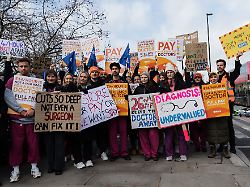Majority wants to go back to the EU
Economic misery makes the British doubt Brexit
07/18/2023, 5:15 p.m
Seven years after the Brexit referendum, the majority of Britons are apparently fed up. The economy is weak and inflation is high. Attempts to turn back the clocks prove difficult.
More than half of Britons would vote for Britain’s return to the European Union in the event of a new referendum. This is the result of a recent survey by British market research institute Yougov. Accordingly, 51 percent of those surveyed would vote for it. Compared to January 2021, when Great Britain left the EU after the Brexit referendum in June 2016, this corresponds to an increase of eleven percentage points. The figures confirm the latest survey results from the Tony Blair Institute. Overall, the data shows how much the mood of the population has changed within seven years.
According to Yougov, around 57 percent of Brits said that the decision to leave the EU was wrong. This is the highest value that the opinion research institute has ever recorded in this survey. One in five British voters who were in favor of leaving the EU at the time now admit that their decision was wrong. Only 32 percent currently consider the decision to be correct.
The advocates of leaving the EU had promised a lot for the domestic economy after Brexit. Three years after the final departure, however, the track record is meager. Rather than enjoy major financial benefits from detaching itself from Brussels, the kingdom is struggling with persistently high inflation and supply chain difficulties. First the truck drivers were missing, then the eggs, then the tomatoes. Then the gas stations ran out of fuel. Brexit restrictions for migrant workers repeatedly push the island to its breaking point.
London was also unable to conclude agreements that would make up for the losses in trade with the EU. A promised lucrative trade agreement with the USA, for example, which the so-called Brexiteers had advertised with, did not come about.
On the third anniversary of Brexit, the German Chamber of Industry and Commerce (DIHK) summarized the outcome of the exit from the EU as an “economic disaster” for Great Britain and the EU. While Great Britain was Germany’s third most important export market in 2016, the country slipped to eighth place in 2022. According to the state-owned company Germany Trade and Invest (GTAI), in 2023 the country could even fall out of the top ten of German trading partners for the first time in recent history.
Up to 30 percent less investment
The inflation rate recently remained at 8.7 percent, which is the highest value among the large western industrialized countries. The key interest rate has meanwhile been raised to five percent, which makes loans for investments and consumption more expensive and thus weighs on the economy. “As a result of leaving the EU, many companies have postponed their investment plans in Great Britain,” said the chief economist at Berenberg Bank, Holger Schmieding, recently on Deutschlandfunk. She are “25 to 30 percent lower than if the trend had continued from before Brexit”. Less business investment means “fewer machines in use and less productivity. Less productivity means higher costs for companies and higher prices for consumers”. The EU as a whole is suffering from “Putin inflation” as a result of the Ukraine war. However, the high inflation in Great Britain also has something to do with Brexit.
Prime Minister Rishi Sunak’s conservative government, which insists that Brexit will bring benefits, is struggling to find solutions. A week ago, hours before an announced five-day strike by teachers, police officers and doctors, Sunak relented and placated workers by promising pay rises for millions of public sector workers. It would have been the longest walkout in the history of the ailing National Health Service (NHS), according to the British news agency PA.
How the expenditure should be financed is controversial. Sunak announced that he would neither take on new debts nor increase taxes. Instead, the fees that people from other countries have to pay if they want to get a visa for the United Kingdom should be increased.
The meat processing industry association in Great Britain warns against such plans. The BMPA (British Meat Processors Association) warned that higher visa fees and contributions to the country’s health service would further exacerbate Britain’s labor shortages and inflation. The hangover mood will remain with British citizens for the foreseeable future. Another referendum is not in sight.
